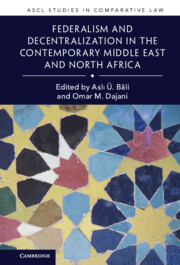Book contents
- Federalism and Decentralization in the Contemporary Middle East and North Africa
- ASCL Studies in Comparative Law
- Federalism and Decentralization in the Contemporary Middle East and North Africa
- Copyright page
- Contents
- Contributors
- Acknowledgments
- 1 Introduction
- Part I Theoretical and Comparative Context
- Part II Decentralization and Governance Reform
- Part III Decentralization and Self-determination
- 9 Autonomy beyond the State
- 10 The Devil Is in the Details
- 11 Turkish Kurdistan
- 12 Control, Responsibility, and the Israeli-Palestinian Decentralization Debacle
- 13 “Stuck Together”
- 14 “Dans ses Frontières Authentiques”?
- Part IV Decentralization, Conflict, and State Fragmentation
- Part V Conclusions
- Index
9 - Autonomy beyond the State
from Part III - Decentralization and Self-determination
Published online by Cambridge University Press: 15 January 2023
- Federalism and Decentralization in the Contemporary Middle East and North Africa
- ASCL Studies in Comparative Law
- Federalism and Decentralization in the Contemporary Middle East and North Africa
- Copyright page
- Contents
- Contributors
- Acknowledgments
- 1 Introduction
- Part I Theoretical and Comparative Context
- Part II Decentralization and Governance Reform
- Part III Decentralization and Self-determination
- 9 Autonomy beyond the State
- 10 The Devil Is in the Details
- 11 Turkish Kurdistan
- 12 Control, Responsibility, and the Israeli-Palestinian Decentralization Debacle
- 13 “Stuck Together”
- 14 “Dans ses Frontières Authentiques”?
- Part IV Decentralization, Conflict, and State Fragmentation
- Part V Conclusions
- Index
Summary
This chapter discusses and compares two different understandings of self-determination in Kurdistan against the background of administrative centralization and nationalization of populations occurring in the nineteenth and twentieth centuries. It is argued that as a result of the intertwining of centralized-territorial state formation and nationalism a new order emerged that saw Kurds turned into a surplus population confronted with assimilation and erasure. Initially Kurdish movements responded to this new political reality by embracing the very principle by which they were excluded: the idea that a population, defined as a nation, is entitled to a state exercising exclusive territorial control. It was in this context that Kurdish national liberation movements emerging after World War II mostly declared the establishment of an independent state in which to build a postcolonial society as an ultimate goal. Towards the end of the twentieth century, and following a critique (and self-critique) on the character of national liberation struggles, a vein in the Kurdish movement started to tie self-determination not to the establishment of a state, but rather to the development of peoples’ capacities to govern themselves. These two understandings are compared and discussed as responses to the nation-statification of society.
Keywords
- Type
- Chapter
- Information
- Publisher: Cambridge University PressPrint publication year: 2023

